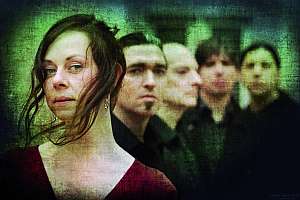 Interview with
Interview with
Hekate
HEKATE is a very interesting ensemble from Germany which fuses ambient electronic styles with traditional folk instruments or if you prefer - Neofolk. We have had opportunity to ask three of their members - Axel Menz (vocals, percussions), Susanne Grosche (vocals) and Jörg Schickerath (percussions) questions about their music, their latest album ‘Die Welt der dunklen Gärten’ (World of Dark Gardens), lyrics, inspirations, myths, legends and so on...
Reflections of Darkness (RoD): Can you take us through the history of the band, the journey from inception to the present?
Axel Menz (Axel): HEKATE started as an experimental atonal project in the early 90’s. We first played at universities and art schools on exhibitions. We started with five members. From those five members I am the only one who “survived”, the others have changed. The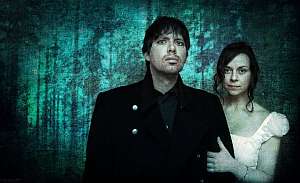 founders were Ingo Müller, guitar and percussion, and me. Ingo left the band after the ‘Goddess’ CD. There were many changes during the years. Today we consist of Achim Weiler, medieval instruments and keyboards, Dirk Diederich, drums , Jörg Schwickerath, percussion, and Susi Grosche, voice. Achim is engaged at a castle as an musician. Further he produces musical contributions for regional theatre plays in his little studio. Jörg plays in his own ambient band called Beam Team. Dirk has got an own Ska band. I’m supporting several bands live on stage and work for my own project CASCARDEUR.
founders were Ingo Müller, guitar and percussion, and me. Ingo left the band after the ‘Goddess’ CD. There were many changes during the years. Today we consist of Achim Weiler, medieval instruments and keyboards, Dirk Diederich, drums , Jörg Schwickerath, percussion, and Susi Grosche, voice. Achim is engaged at a castle as an musician. Further he produces musical contributions for regional theatre plays in his little studio. Jörg plays in his own ambient band called Beam Team. Dirk has got an own Ska band. I’m supporting several bands live on stage and work for my own project CASCARDEUR.
We love our name. The goddess Hekate connects various character properties, which we work out over the years. But the most important aspect is that Hekate belonged to many cultures, like the Romans, the Greek, Asia Minor… It symbolises the power of an archaic culture and stands for the old way. First we were an experimental group. We were influenced by industrial bands from the 80’s like EINSTÜRZENDE NEUBAUTEN and SPK, but also dark wave bands like JOY DIVISION, DEVO, DAVID BOWIE, KLAUS NOMI, TEST DEPT. But our influence goes from classical Folk to groups like CURRENT 93; DEATH IN JUNE to our favourite Band DEAD CAN DANCE. We also like MOBY, MASSIVE ATTACK, DELIRIUM and other Ambient Bands. To play live is the best for us. It is the fulfilment of all our work and creativity. During a live performance we see if a song fits to the audience. To play live is really the best for our band. Rituals are very important for us before a live performance. A concert of HEKATE has a spiritual level as it is dedicated to our ancestor and gods. “Du siehst mein Sohn, zum Raum wird hier die Zeit” (“See my son, time becomes room) (Richard Wagner, Parsifal 1882). A ritual helps to experience a cosmic principle and to use it on your way through life.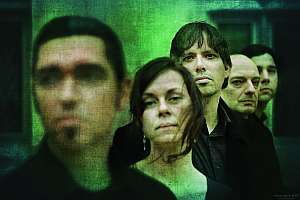 At the moment we are using German smoke rituals at live performances. The smoke is a sign to the gods. The scent is their food. As we use mostly the traditional smokes we wake memories of holy times. We use herbs from our native country. There is a different smoke ritual for every season. I’m collecting the herbs in our forests as the shamans of our ancestors did it. So let us start….
At the moment we are using German smoke rituals at live performances. The smoke is a sign to the gods. The scent is their food. As we use mostly the traditional smokes we wake memories of holy times. We use herbs from our native country. There is a different smoke ritual for every season. I’m collecting the herbs in our forests as the shamans of our ancestors did it. So let us start….
RoD: Your music has a great fascination with history, firstly what has brought the fondness for historical musical instruments and secondly why is history itself such inspiration to you?
Axel: During the last years we became interested in European history, old songs and legends. Furthermore we became more self-confident and found our own style. The main thing of the music is the percussions, connected with old instruments and melody lines and actually with modern clichés like electric ambient sounds. We approach most of our songs from ideas we get from reading books, visiting European landscapes or by telling myths from friends. We choose most themes for songs by our instinct not for special reasons. One influence is certainly a movement of the young people in Germany from the 20ies, called ‘Wandervogel’. We are inspired by painters like Fidus, Diefenbach and furthermore we are interested in classical music as e.g. Edward Grieg and Schubert. The world lost its magic. Now you can explain nearly everything through science. In former times a moon-darkness was a great wonder but today you know the scientific backgrounds. Where is space left for imagination and phantasm? Ancient men received a lot of joys from nature. We can learn from ancient cultures about their power and forgotten rituals.
RoD: Another aspect of your work is using poetry as basis for your lyrics - are you inspired by poetry personally or is this choice for the suitability of imaginative texts in order to enrich your music by giving it a visual aspect as they’re predominantly imagery rich as well?
Susanne Grosche (Susi): Actually, you have already answered the question! In general, we love poetry. And there are certain poems which, as you say, evoke certain pictures. And we are not the first musicians who paint with music! 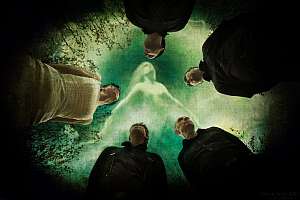 RoD: Who are your personal favourites within poetry and whose poetry would you like to work into your music in your next projects?
RoD: Who are your personal favourites within poetry and whose poetry would you like to work into your music in your next projects?
Axel: Life and work of Lord Byron is very fascinating for me. He was an adventurer, miraculous poet and eccentric. I love his poem and it was my desire to spend some of his greatest works.
“When we two parted
In silence and tears,
Half broken-hearted
To sever for years,
Pale grew thy cheek and cold,
Colder thy kiss;
Truly that hour foretold
Sorrow to this”
And also, Joseph von Eichendorff is one of the best poets from Germany ever. He is the god of our romantic novelists. The poem full of German melancholy is exactly how I feel about it. I think our next CD will be very archaic ritualistic. I have no idea which poetry I can use for it. But I will use in the future some poems from Gustav Meyrink and Hans Heinz Ewers also Stefan George. We will see.
RoD: You seem to be very capable of joining folklore with modern feel, making it relevant for the present. Wherein lays your success in your opinion, is this a conscious decision / direction or a spontaneous result of your music?
Jörg Schickerath (Jörg): This is a really tough question to answer... Probably the truth is a combination of both: there is a conscious decision to work in this special direction, but on the other hand, the music originates in our heads and hearts in a way which cannot be influenced that much with artistic concepts, if you understand what I mean. My personal opinion about music making is that the music already exists (somewhere) and just needs us to be transferred into the physical world...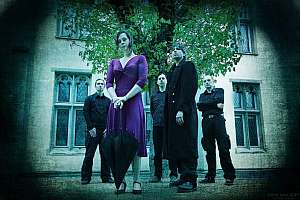 RoD: Considering folkloric elements of your work, is the preservation of a tradition some of your concerns and reasons why you integrate it as less and less people are familiar with the folklore of their own countries and/or of other countries/cultures? Or is it simply because it inspires you?
RoD: Considering folkloric elements of your work, is the preservation of a tradition some of your concerns and reasons why you integrate it as less and less people are familiar with the folklore of their own countries and/or of other countries/cultures? Or is it simply because it inspires you?
Axel: That is an interesting question the truth has something to do with my life and my passion for development. I am a seeker for truth, a pathfinder. I want to find the traditions of our ancestors. It doesn’t matter which countries or cultures. My first suggestion about the question was Herrman Hesse’s novel ‘Siddhartha’: “No, there was no teaching a truly searching person, somebody who truly wanted to find could accept”.
RoD: You take a lot of inspiration from myths and legends. How much do they influence and inspire you personally?
Axel: Sometimes I feel like a Roman conquistador with all my ideas full of myths and legends from orient and occident. My religion is a pagan mix of different cultures. I live in the countryside in a culturally very important area. Besides the ancient places of worship of the Celts and Germans there are also sanctuaries from the Roman conquerors. I am connected very close to nature and it is important for me to research and experience old rites and cultures. All this power is an inspiration for me for the music and my life. Sometimes I think our modern world is only temporary. The truth will be found in our nature.
RoD: You have also used many languages in your work, is this part of the philosophy of the band to find a unifying connection between people, join the bridges so to speak?
Susi: This is one aspect of this intention, but not the first! The language in the songs is a kind of medium, which transports the contents of the lyrics better. For example, our ‘Anais Nin’ was a French woman; French lyrics "underline" the atmosphere, the character of the story.
RoD: Which bands/ composers are your major influences?  Jörg: The present 5 band members of HEKATE have quite different musical backgrounds and preferences. Influences reach from early gothic to medieval folk, classical music to electronic music and even modern pop. To name an outstanding influence of the present HEKATE is certainly the legendary DEAD CAN DANCE, but it is more the spiritual quality and intensity of their music-making which we admire than a certain style of playing or composing, which would lead to copying maybe, something we certainly don’t want. My personal preferences lay on the electronic side reaching from BRIAN ENO’s classical ambient over minimal techno to post-Dubstep styles life scuba or shackle ton but also folk bands like FAUN. Everything which creates some sort of special atmosphere, but the other band members will tell you something different...
Jörg: The present 5 band members of HEKATE have quite different musical backgrounds and preferences. Influences reach from early gothic to medieval folk, classical music to electronic music and even modern pop. To name an outstanding influence of the present HEKATE is certainly the legendary DEAD CAN DANCE, but it is more the spiritual quality and intensity of their music-making which we admire than a certain style of playing or composing, which would lead to copying maybe, something we certainly don’t want. My personal preferences lay on the electronic side reaching from BRIAN ENO’s classical ambient over minimal techno to post-Dubstep styles life scuba or shackle ton but also folk bands like FAUN. Everything which creates some sort of special atmosphere, but the other band members will tell you something different...
RoD: What are your plans for the future regarding albums and live performances?
Axel: I hope that we have the chance to present our new CD live. That would be the greatest point for our future.
RoD: Anything you’d like to say to your listeners and fans out there?
Axel: Love and Light to everybody, thank you for your interest and kindles regards from HEKATE.
RoD: Thanks very much for the interview!




